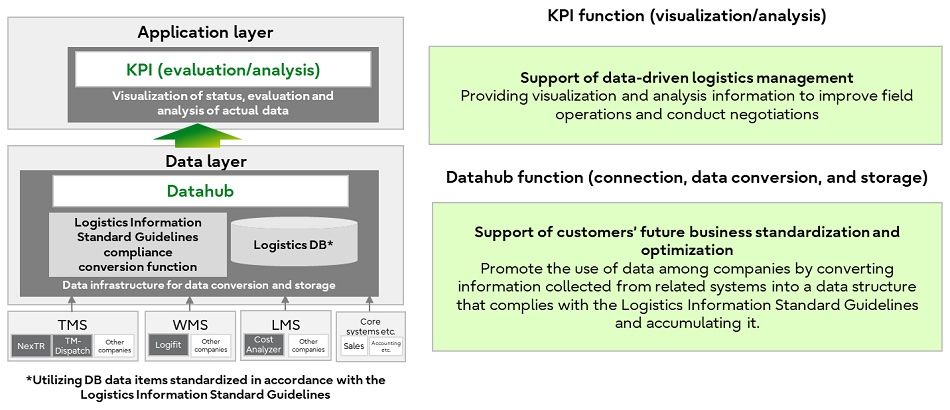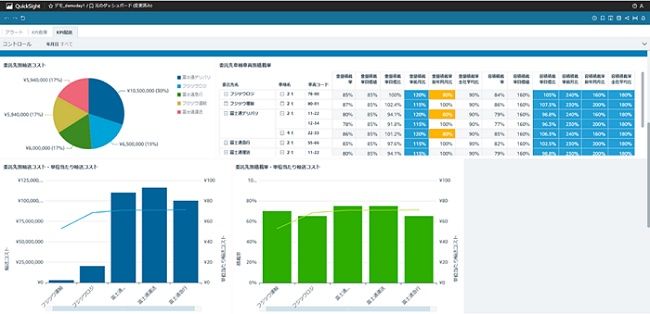
TOKYO, Dec 14, 2023 – (JCN Newswire via SeaPRwire.com) – Fujitsu today announced the launch of a new cloud-based logistics data standardization and visualization service for shippers, logistics companies, and vendors across the supply chain. The service will offer new tools to customers to achieve sustainability in their operations and address a variety of challenges, including looming shortages of truck drivers, the urgent need to reduce the carbon footprint of transportation, and compliance with stricter industry regulations.
The Amazon Web Services (AWS) (1) cloud-based service converts and standardizes a wide range of logistics data for areas like inventory and transport to empower users to share insights safely and easily to internal stakeholders, as well as with other companies to streamline transportation and enable joint logistics planning between players in different industries across the entire supply chain. By providing indicators for visualizing and analyzing logistics data, the new service also supports business improvement and process reform to optimize operations amidst growing complexity and uncertainties for supply chain managers.
Fujitsu will launch the new service in the Japanese market from December 14, 2023 as an offering for Trusted Society under Fujitsu Uvance, with the aim to create an environment-first, resilient society in which people can live in peace and prosperity.

Background
As part of new labor standards to promote work style reform, the Japanese government will introduce new legal regulations to limit overtime for truck drivers in Japan that will take effect in April 2024. Concerns remain that this could lead to a severe shortage of truck drivers (the so-called “2024 problem”), and that shipper companies may not be able to carry packages under the existing contract terms, making it difficult for them to continue their business. Without appropriate measures, the Japanese Cabinet Secretariat estimates a 14% capacity shortage in FY 2024 and a 34% capacity shortage in FY 2030 (2) in the logistics industry. In addition, the amount of cargo that truck drivers are allowed to carry will be limited by stricter regulations on the working hours of drivers, and logistics companies will face the same challenges as shipper companies in securing profits. To ensure future sustainable and stable logistics operations, efficient allocation of resources including vehicles and drivers in the logistics industry represents an important challenge.
To address these issues, the Japanese Ministry of Land, Infrastructure, Transport and Tourism (MLIT) and the Japanese Ministry of Economy, Trade and Industry (METI) have issued a series of policies and guidelines to support the logistics industry, including the “Logistics Information Standard Guidelines” (3).
Based on the planned policies of the Japanese government, Fujitsu developed a new cloud-based service that promotes the standardization of logistics data and contributes to supply chain efficiency.
Key Features of the new service1. Automated data conversion to a format in accordance with the Logistics Information Standard Guidelines
Fujitsu has been promoting technology research and infrastructure development required for logistics and commercial distribution data infrastructure as part of the “Cross-ministerial Strategic Innovation Promotion Program (SIP) Smart Logistics Service” project of the Japanese Cabinet Office. Fujitsu leveraged the results of this research to develop a new service in compliance with the Logistics Information Standard Guidelines published by MLIT and METI, offering a solution for practical application ahead of other companies. By automatically transforming and standardizing logistics data formats from multiple different systems, which often create bottlenecks in the supply chain, Fujitsu aims to facilitate inter-company collaboration, contribute to the solution of societal issues in the logistics industry, and realize optimization of the overall supply chain.
2. Functions to connect, transform, and store a wide range of logistics data
The new solution includes a datahub function for seamless integration of logistics data from various logistics related systems. In this way, the solution enables advanced analysis and utilization within and between companies by consolidating and storing a wide range of logistics data including inventory and transport data.
Adapter feature to simplify external connectionsFunction to convert data from a company-specific layout to a layout compliant with the Logistics Information Standards GuidelinesStorage function for data utilization in cooperation with other system services
3. Visualization and analysis function through logistics KPI
The new service provides a logistics KPI function that enables numerical visualization of consolidated logistics data and analysis for improvement and reform. Basic logistics KPIs are provided as standard and visualized and analyzed in tables and graphs to promote business improvement and process reform.

Use case scenarios of the new service
Utilization by multiple companies within the supply chain
– By linking logistics data from different user companies including shipper companies (senders and receivers) and logistics companies, the new solution can improve the efficiency of operations including inspection work and slip entry by digitizing field operations.
– By connecting the entire supply chain through information, the solution enables users to strengthen their business continuity including inventory allocation planning, distribution center operation planning and vehicle arrangements for transport and delivery by using standardized logistics data.
– By promoting shared use of vehicles and drivers through joint distribution among companies, the solution addresses the challenge of driver shortages and enables optimization of vehicle usage; by optimizing and reducing drivers’ total miles, the solution further contributes to the reduction of energy consumption.
Use by individual corporate customers
– The new service integrates data from customers’ core systems and multiple logistics systems, including WMS (warehouse management systems) and TMS (transportation management systems); users can utilize the solution as a data infrastructure for visualization and analysis for improvement and reform, and for linkage with various cloud services.
– By utilizing standardized data in the supply chain, the solution further supports users in preventing food loss by improving the accuracy of demand forecasting and optimizing inventory throughout the supply chain.
– In emergency situations, the solution further enables rapid situational analysis and emergency measures including alternative transport and delivery methods.
Future Plans
Moving forward, Fujitsu will combine the new service with other Fujitsu Uvance offerings and work with global vendors to strengthen global customers’ business continuity to contribute to the solution of societal issues in the logistics industry.
As part of a strategic collaboration agreement concluded with AWS in 2021, the new service is implemented in a serverless architecture that supports agile modern application development with the support of AWS Professional Services. Fujitsu will continue to expand capabilities of the new solution in accordance with future customer and industry needs.
Tetsuya Aida, Senior Manager, SI Management, Strategic Partners, Amazon Web Services Japan, comments:
“Cloud technology is rapidly transforming the logistics industry by enabling smart solutions that leverage data-driven insights to increase worker productivity and accelerate business growth. Amazon Web Services Japan GK is excited to see the launch of Fujitsu’s new service. Fujitsu has a wealth of knowledge and experience in the mobility and logistics sectors, and is partnering with AWS to drive digital transformation in diverse industries. We anticipate that this solution will contribute to solving problems not only in the logistics industry, but also in our daily lives, and also support customers in innovating their business.”
Tomohiro Okuzumi, Executive Director at Japan Physical Internet Center
“Through the ‘Logistics Information Standard Guidelines,’ JPIC aims to contribute to the realization of sustainable logistics by enabling cooperation (connection) and collaborative utilization (sharing) of distribution information in the supply chain, among distribution centers, transportation means including trucks and railways, and human resources working in the logistics industry. We believe that Fujitsu’s new service can help to solve societal problems by standardizing logistics data.”
[1]Amazon Web Services :Headquarters: Seattle, Washington; CEO Adam Selipsky
[2]Source :Japanese Cabinet Secretariat “Policy Package for Logistics Innovation” (Decision of the Ministerial Conference on Logistics Innovation in Japan on June 2, 2023) (in Japanese)[3]Logistics Information Standard Guidelines :Japanese standard developed during the “Cross-ministerial Strategic Innovation Promotion Program (SIP) Smart Logistics Service, a Japanese project led by the Japanese Cabinet Office over a period of 5 years from 2018 (in Japanese)
About Fujitsu
Fujitsu’s purpose is to make the world more sustainable by building trust in society through innovation. As the digital transformation partner of choice for customers in over 100 countries, our 124,000 employees work to resolve some of the greatest challenges facing humanity. Our range of services and solutions draw on five key technologies: Computing, Networks, AI, Data & Security, and Converging Technologies, which we bring together to deliver sustainability transformation. Fujitsu Limited (TSE:6702) reported consolidated revenues of 3.7 trillion yen (US$28 billion) for the fiscal year ended March 31, 2023 and remains the top digital services company in Japan by market share. Find out more: www.fujitsu.com.
Press Contacts
Fujitsu Limited
Public and Investor Relations Division
Inquiries
Copyright 2023 JCN Newswire via SeaPRwire.com.


